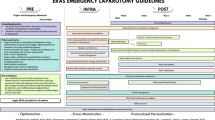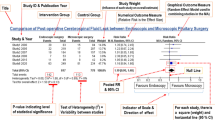Abstract
Background
Team familiarity has been shown to be important for operative efficiency and number of complications, but it is unclear for which types of operations and for which team members familiarity matters the most. The objective of this study is to further our understanding of familiarity in the OR by quantifying the relative importance of familiarity among all possible core team dyads, and defining the impact of team level familiarity on outcomes.
Materials and methods
Using a retrospective chart and administrative data review, five years of data from two health systems (14 hospitals) and across two procedures, (knee arthroplasty and lumbar laminectomy) were included. Multilevel modeling approach and a dominance analysis were conducted.
Results
For each previous surgery that any two members of the core surgical team had participated in together, the length of surgery decreased significantly. The familiarity of the scrub and the surgeon was the most significant relationship for knee arthroplasty across the two hospitals, and laminectomies at one hospital.
Conclusions
The relationship between familiarity of the surgical team and surgical efficiency may be more complex than previously articulated. Familiarity may be more important for certain types of procedures. The familiarity of certain dyads may be more important for certain types of procedures.
Similar content being viewed by others
References
Haynes AB, Weiser TG, Berry WR et al (2009) A surgical safety checklist to reduce morbidity and mortality in a global population. N Engl J Med 360:491–499
Henrickson Parker S, Wadhera R, Elbardissi AW et al (2009) Development and pilot evaluation of a preoperative briefing protocol for cardiovascular surgery. J Am Coll Surg 208:1115–1123
Xiao Y, Seagull FJ, Mackenzie C, Klein K (2004) Adaptive leadership in trauma resuscitation teams: a grounded theory approach to video analysis. Cogn Technol Work 6:158–164
Fitzgerald M, Gocentas R, Dziukas L et al (2006) Using video audit to improve trauma rescuscitation-time for a new approach. Can J Surg J Can Chir 49:208–211
Vashdi D, Bamberger PA, Vashdi DR (2013) Can surgical teams ever learn? The role of coordination, complexity and transitivity in action team learning. Acad Manag J 56:945–971
Harrison DA, Mohammed S, Mcgrath JE et al (2003) Time matters in team performance: effects of member familiarity, entrainment, and task discontinuity on speed and quality. Pers Psychol 56:633–669
Littlepage G, Robison W, Reddington K (1997) Effects of task experience and group experience on group performance, member ability, and recognition of expertise. Organ Behav Hum Decis Process 69:133–147
Huckman RS, Staats BR, Upton DM (2008) Team familiarity, role experience, and performance: evidence from indian software services. Manag Sci 55:85–100
Easton GS, Rosenzweig ED (2012) The role of experience in six sigma project success: an empirical analysis of improvement projects. J Oper Manag 30:481–493
Elbardissi AW, Duclos A, Rawn JD et al (2013) Cumulative team experience matters more than individual surgeon experience in cardiac surgery. J Thorac Cardiovasc Surg 145:328–333
Xu RA, Carty MJ, Orgill DP, Lipsitz SD (2013) The teaming curve: a longitudinal study of the influence of surgical team familiarity on operative time. Ann Surg 258:953–957
Kurmann A, Keller S, Tschan-Semmer F et al (2014) Impact of team familiarity in the operating room on surgical complications. World J Surg 38:3047–3052. https://doi.org/10.1007/s00268-014-2680-2
Xiao Y, Jones A, Zhang B et al (2014) Team consistency and occurrences of prolonged operative time, prolonged hospital stay, and hospital readmission: a retrospective analysis. World J Surg 39:890–896. https://doi.org/10.1007/s00268-014-2866-7
Maruthappu M, Duclos A, Zhou CD et al (2016) The impact of team familiarity and surgical experience on operative efficiency: a retrospective analysis. J R Soc Med 109:147–153
Finnesgard EJ, Pandian TK, Kendrick ML, Farley DR (2018) Do not break up the surgical team! familiarity and expertise affect operative time in complex surgery. Am J Surg 215:447–449
Gillespie BM, Chaboyer W, Fairweather N (2012) Factors that influence the expected length of operation: results of a prospective study. BMJ Qual Saf 21:3–12
Frasier JL, Pavuluri Quamme SR, Becker A et al (2017) Investigating Teamwork in the operating room: engaging stakeholders and setting the agenda. JAMA Surg 152:109–111
Espinosa JA, Slaughter SA, Kraut RE et al (2007) Familiarity, Complexity, and Team Performance in Geographically Distributed Software Development. Organ Sci 18:613–630
Cheng H, Clymer JW, Chen BP et al (2018) Prolonged operative duration is associated with complications : a systematic review and meta-analysis. J Surg Res 229:134–144
Jackson TD, Wannares JJ, Lancaster RT et al (2011) Does speed matter? The impact of operative time on outcome in laparoscopic surgery. Surg Endosc 25:2288–2295
Visser A, Geboers B, Gouma DJ et al (2015) Predictors of surgical complications : a systematic review. Surgery 158:58–65
Staats BR (2012) Unpacking Team Familiarity: The effects of geographic location and hierarchical role. Prod Oper Manag 21:619–635
Ulrike G (2012) Estimators of relative importance in linear regression based on variance decomposition. Am Stat 61:139–147
Okhuysen GA, Bechky BA (2009) Coordination in organizations Acad Manag Ann 3:463–502
Henrickson Parker S, Schmutz JB, Manser T (2018) Training needs for adaptive coordination: utilizing task analysis to identify coordination requirements in three different clinical settings. Gr Organ Manag 43:504–527
Tschan F, Keller S, Semmer N, et al Supporting situation awareness by a short intervention to foster fnformation exchange during surgical procedures. In: INGRoup annual conference, St Louis, MO
Henrickson Parker S, Laviana AA, Wadhera RK et al (2010) Development and evaluation of an observational tool for assessing surgical flow disruptions and their impact on surgical performance. World J Surg 34:353–361. https://doi.org/10.1007/s00268-009-0312-z
Powezka K, Normahani P, Standfield NJ, Jaffer U (2020) A novel team familiarity score for operating teams is a predictor of length of a procedure: a retrospective Bayesian analysis. J Vasc Surg 71:959–966
Acknowledgements
A special thanks to Ronex Muthukattil for facilitating data extraction, Sandra Keller for thoughtful edits on multiple versions of this manuscript, and Carolyn Winslow for her early support of the project.
Author information
Authors and Affiliations
Contributions
SHP conceived the study, collected the data, contributed the data, wrote and made substantial edits to the paper. XL performed the analysis, wrote and made substantial edits to the paper. SF collected the data, contributed the data, made substantial edits to the paper, provided subject matter expertise. TM performed the analysis and contributed analysis tools, made substantial edits to the paper. SS contributed data analysis tools, made substantial edits to the paper, provided subject matter expertise. SK conceived the study, performed the analysis, wrote and made substantial edits to the paper, provided subject matter expertise.
Corresponding author
Ethics declarations
Conflict of interest
This work was supported by a grant from the Carilion Clinic Research Acceleration Program (Henrickson Parker PI) and the MedStar Scholars program (Fitzgibbons PI). There are no other relevant disclosures for any authors. There are no conflicts of interest in this manuscript for any of the authors. This study was approved by the Carilion Clinic IRB (2023).
Additional information
Publisher's Note
Springer Nature remains neutral with regard to jurisdictional claims in published maps and institutional affiliations.
Rights and permissions
About this article
Cite this article
Parker, S.H., Lei, X., Fitzgibbons, S. et al. The Impact of Surgical Team Familiarity on Length of Procedure and Length of Stay: Inconsistent Relationships Across Procedures, Team Members, and Sites. World J Surg 44, 3658–3667 (2020). https://doi.org/10.1007/s00268-020-05657-1
Published:
Issue Date:
DOI: https://doi.org/10.1007/s00268-020-05657-1




